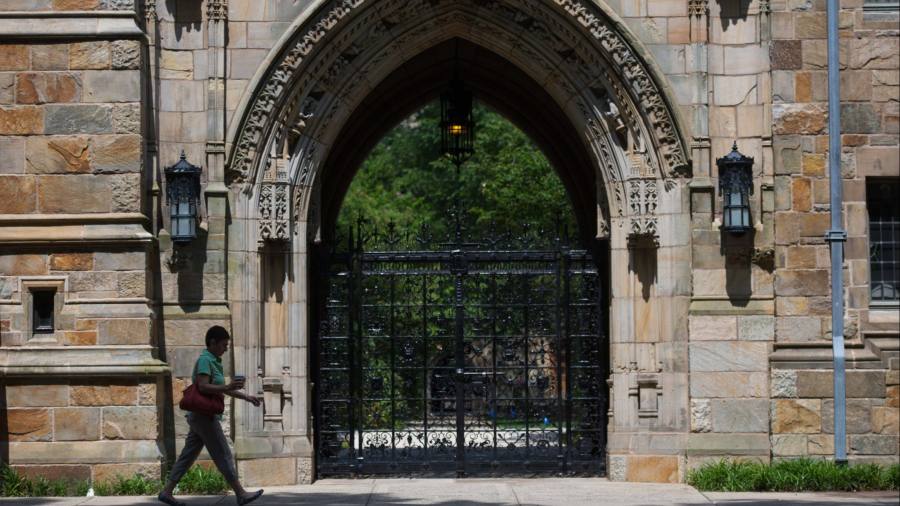
In the days since the US Supreme Court ruled against affirmative action in higher education, Adam Nguyen has been emailing warnings to the Asian clients that he advises on US elite college admissions.
“There’s a perception now that it’s easier for them to get in. That’s false,” he said. “They still have to distinguish themselves on subjective measures. I don’t want my clients to be lulled into complacency.”
America’s highest court last month ruled that it was unconstitutional for Harvard and the University of North Carolina (UNC) to use race as a basis for admissions. The decision was cheered by some who claimed that affirmative action discriminated against Asian students.
One New York high school teacher, who requested anonymity, said many of his brightest pupils had been rejected by the top institutions because of their ethnicity. “The real victims are hard-working Asian working-class kids. Everything goes against them,” he said.
But others fear that the ruling will reduce access to top universities by African American, Latino and other historically under-represented minorities. They argue that there are many more avenues for admission for white and wealthy applicants than those from more disadvantaged backgrounds.
America’s most competitive universities are scrambling to respond to this and two other major developments that have called into question their admissions policies.
Less than a week after the Supreme Court judgment, a complaint was filed with the US Department of Education over the preference given by elite colleges to “legacy” students whose families have previously attended or donated.
Compounding it all is a separate Supreme Court judgment overturning President Joe Biden’s proposed student debt forgiveness programme.
The universities have been cautious in their public statements while hinting at how they will continue to apply discretion in selection. All eight Ivy League colleges, as well as many others which supported Harvard and UNC’s defence, have stressed that they will respect the law while seeking to maintain diversity in their student intakes through other means.
On Friday, Kevin Guskiewicz, Chancellor of UNC, said in a statement: “We will comply with the court’s ruling that an applicant’s lived racial experience cannot be credited as ‘race for race’s sake’, but instead under some circumstances may illuminate an individual’s character and contributions.”
Vassar College, which held an online discussion with students, staff and alumni last week, pledged that “we will not be daunted in our mission to bring together diverse communities of learning”.
Christina Paxson, president of Brown, said in a statement that her institution “is and will remain firmly committed to advancing the diversity” of the university while convening “a thorough legal review” of the affirmative action decision over the summer.
At Cornell, one academic said he expected the ruling to dominate the “midsummer check in” of senior staff, while adding: “The overall sense I get on campus is a general confidence that we will be able to meet this challenge.”
Yale is hosting a discussion on the ruling in its law school in September and, mirroring its peer Princeton, has announced the creation of an Office of Educational Opportunity to provide support for students from less privileged backgrounds to reduce the risk of dropping out and ensure that they can fully benefit from college life.
Like other institutions, it is exploring strengthened outreach programmes to encourage applications from students in communities that are traditionally less represented, and using proxies for race such as socio-economic background. It also offers tuition waivers for those from families with lower incomes.
While most elite colleges already offer discounts to those with financial need, and Biden has pledged to reintroduce student loan forgiveness proposals, some suggest that the Supreme Court’s judgment may discourage lower-income applicants because of the intimidating cost of elite colleges.
More broadly, college consultants warn that applications will in future become still more opaque and complex, including for foreign students.
Barbara Coward, founder of MBA 360 Admissions, said: “The affirmative action decision has introduced more anxiety into the application process. Notably for Indians: should they use their English name rather than their given name on their application?”
Nguyen, who runs the advisory service Ivy Link, said his message to black and latino clients was “we can’t rely on affirmative action to give you a boost. I advise them to find other subjective, contextual measures. When it comes time to complete application, we’ll find ways to introduce race.”
The shift away from the use of test scores by universities since Covid in favour of “holistic admission” based on broader contextual factors, such as ability to overcome obstacles and commitment, has added to the competition. He said he would not necessarily dissuade Asians from pursuing passions such as violin, but “you need be to very accomplished”, and many would be better to focus on intellectual pursuits and stated interests in more unusual subjects.
He also predicted that pressure would grow against legacy admissions, notably with a less favourable view by recruiters of excellence in elite, expensive sports such as lacrosse, squash, fencing, skiing and sailing. He is already advising families with students in the sixth or seventh grade to focus on other activities to stand out.
A shift away from wealthy families as potential donors would certainly be less elitist. Yet it will create other tensions over the funding models of the elite universities, including their ability to subsidise lower-income applicants.
“There are huge implications financially,” said Allen Koh, founder of Cardinal Education, an admissions consultancy.
“There’s been a lot of money on the sidelines waiting to see how universities will react. I’ve been involved in conversations where hundreds of millions of dollars in donations have been withheld and are in a state of limbo.”
As Coward put it: “We all know that it is unfair when legacy applicants get admitted based on state-of-the-art buildings bequeathed from their ancestors but the stacks of money to run a pricey university has to come from somewhere.”
This article has been amended since initial publication to correct the spelling of Christina Paxson’s name